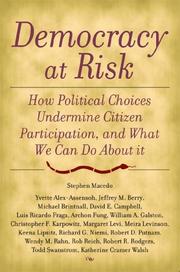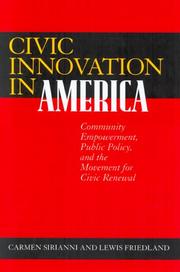| Listing 1 - 10 of 51 | << page >> |
Sort by
|
Book
ISBN: 0394412362 9780394412368 Year: 1978 Publisher: New York Random House
Abstract | Keywords | Export | Availability | Bookmark
 Loading...
Loading...Choose an application
- Reference Manager
- EndNote
- RefWorks (Direct export to RefWorks)
Political participation --- Forecasting --- Political participation - United States
Book
ISBN: 0669024651 9780669024654 Year: 1979 Publisher: Lexington [etc.] D.C. Heath
Abstract | Keywords | Export | Availability | Bookmark
 Loading...
Loading...Choose an application
- Reference Manager
- EndNote
- RefWorks (Direct export to RefWorks)
Political participation --- United States --- Political participation - United States.
Book
ISBN: 0190218681 0199987270 0199987289 0199987262 1322570701 9780199987276 9780190218683 9780199987269 Year: 2014 Publisher: New York : Oxford University Press,
Abstract | Keywords | Export | Availability | Bookmark
 Loading...
Loading...Choose an application
- Reference Manager
- EndNote
- RefWorks (Direct export to RefWorks)
Citizen participation has undergone a radical shift since anxieties about 'bowling alone' seized the nation in the 1990s. Many pundits and observers have cheered America's twenty-first-century civic renaissance - an explosion of participatory innovations in public life. Invitations to 'have your say!' and 'join the discussion!' have proliferated. But has the widespread enthusiasm for maximizing citizen democracy led to real change? This book examines how participatory innovations have reshaped American civic life over the past two decades.

ISBN: 0815754043 0815754051 9780815754046 9780815754053 Year: 2005 Publisher: Washington, D.C. Brookings Institution
Abstract | Keywords | Export | Availability | Bookmark
 Loading...
Loading...Choose an application
- Reference Manager
- EndNote
- RefWorks (Direct export to RefWorks)
""Documents how recent trends in civic engagement have been shaped by political institutions and public policies and recommends ways to increase the amount, quality, and distribution of civic engagement, focusing on elections, the metropolis, and the nonprofit sector and philanthropy""--Provided by publisher.
Political systems --- United States --- Political participation - United States. --- Political participation --- Citizenship --- Government - U.S. --- Law, Politics & Government --- Political Rights - U.S. --- United States of America
Book
ISBN: 0415911346 Year: 1995 Publisher: New York ; London Routledge
Abstract | Keywords | Export | Availability | Bookmark
 Loading...
Loading...Choose an application
- Reference Manager
- EndNote
- RefWorks (Direct export to RefWorks)
Political participation --- Social movements --- History --- United States --- 20th century --- Politics and government --- 1963-1969 --- Social conditions --- 1960-1980 --- Political participation - United States - History - 20th century.

ISBN: 0874362318 9780874362312 Year: 1976 Publisher: Santa Barbara, Calif. : Clio Books,
Abstract | Keywords | Export | Availability | Bookmark
 Loading...
Loading...Choose an application
- Reference Manager
- EndNote
- RefWorks (Direct export to RefWorks)
Book
ISBN: 9780190277628 9780190277635 0190277637 0190277629 Year: 2016 Publisher: New York [etc.] Oxford University Press
Abstract | Keywords | Export | Availability | Bookmark
 Loading...
Loading...Choose an application
- Reference Manager
- EndNote
- RefWorks (Direct export to RefWorks)
"In Populism's Power, Laura Grattan looks at how populism cultivates the aspirations of ordinary people to exercise power over their everyday lives and their collective fate. She considers a range of populist moments and reopens the idea that grassroots movements can play a key role in democratizing power and politics in America"--
Book
ISBN: 0520909755 0585181683 0520068300 9780520909755 9780585181684 9780520065260 0520065263 9780520068308 0520065263 Year: 1989 Publisher: Berkeley University of California Press
Abstract | Keywords | Export | Availability | Bookmark
 Loading...
Loading...Choose an application
- Reference Manager
- EndNote
- RefWorks (Direct export to RefWorks)
Have the American people grown more politically sophisticated in the past three decades, or do they remain relatively ignorant of the political world? Did a "great leap forward" take place during the 1960s in which our citizenry became involved and adept voters? In this important book, Eric Smith addresses these and other provocative questions that have long befuddled political scientists and policymakers.Much of the current wisdom about American voters derives from an argument advanced in a volume entitled The Changing American Voter, written by Nie, Verba, and Petrocik. In this work, the authors contend that the electorate made a "great leap forward" in political sophistication and ideological thinking between the 1960 and 1964 elections. They argue that people changed in response to a shifting environment, and that, in particular, the surge of protest and ideological rhetoric between 1960 and 1964 engendered a new political savvy and sophistication. In their view, people learned to understand politics better, to relate the issues to the candidates more accurately, and to cast more informed, intelligent votes.In The Unchanging American Voter, Smith takes issue with this portrait of an engaged American citizenry and replaces it with a quite different picture of the voters of this nation. He posits a more bleak political landscape in which the typical voter knows little about politics, is not interested in the political arena and consequently does not participate in it, and is even unable to organize his or her attitudes in a coherent manner. To support this view, Smith demonstrates how the indices by which Nie, Verba, and Petrocik measured levels of sophistication during the 1960s were methodologically flawed and how a closer examination of supposed changes reveals only superficial and unimportant shifts in the ways voters have approached the ballot box since the 1950s.The Unchanging American Voter is an intelligent and original work that provides a new perspective of the American citizenry. It is sure to engender discussion and debate about the dynamics of voting in postwar America.
Book
ISBN: 9780199939428 9780190464424 019993942X Year: 2016 Publisher: New York : Oxford University Press, USA,
Abstract | Keywords | Export | Availability | Bookmark
 Loading...
Loading...Choose an application
- Reference Manager
- EndNote
- RefWorks (Direct export to RefWorks)
"In September 2011, two leading civic engagement advocacy organizations headed, respectively, by Robert Putnam and Peter Levine released a joint report showing that a region's level of civic engagement was a strong predictor of its ability to recover from the Great Recession. This finding confirms what advocates of civic engagement have long hypothesized: that strengthening the networks between government and civil society and increasing citizen participation results in better government and better community outcomes. However, citizens concerned about the economic crisis need more than just deliberation or community organizing alone to achieve these outcomes. What they need, according to Peter Levine, is a movement devoted to civic renewal. Deliberative democracy-the idea that true democratic legitimacy derives from open, inclusive discussion and dialogue rather than simple voting-has become an extremely influential concept in the last two decades. In We Are the Ones We Have Been Waiting For, Peter Levine contends that effective deliberative democracy depends upon effective community advocacy. Deliberation, he shows, is most valuable when talk and debate are integrated into a community's everyday life. To illustrate how it works, Levine draws lessons from both community organizing and developmental psychology, and uses examples of successful efforts from communities across America as well as fledgling democracies in Africa and Eastern Europe. By engaging in this type of civic work, American citizens can meaningfully contribute to civic renewal, which, in turn, will address serious social problems that cannot be fixed in any other way"--

ISBN: 0520926005 159734544X 9780520926004 0585390053 9780585390055 9781597345446 9780520226364 0520226364 9780520226371 0520226372 Year: 2001 Publisher: Berkeley University of California Press
Abstract | Keywords | Export | Availability | Bookmark
 Loading...
Loading...Choose an application
- Reference Manager
- EndNote
- RefWorks (Direct export to RefWorks)
In this book, two leading experts on community action provide the first scholarly examination of the civic renewal movement that has emerged in the United States in recent decades. Sirianni Friedland examine civic innovation since the 1960's as social learning in four arenas (community organizing/development, civic environmentalism, community health, and public journalism), and they link local efforts to broader networks and to the development of ""public policy for democracy.
| Listing 1 - 10 of 51 | << page >> |
Sort by
|

 Search
Search Feedback
Feedback About UniCat
About UniCat  Help
Help News
News